For the second time in less than a year Portlanders got the chance to celebrate the opening of a new bridge over the Willamette River.
“We’re going to need to find a way to invade Clackamas County to recoup some of our costs; but seeing they have more guns than we do we should probably come up with a well thought out plan before we do anything.”
— Steve Novick, Portland City Commissioner
Thousands of people flocked to Sellwood on Saturday to get their first glimpse of the bridge that bears the neighborhood’s name. Expected to open to traffic on March 1st, the new $300 million Sellwood Bridge will replace a bruised and battered span that opened 91 years ago. Yesterday’s celebration was an opportunity for Multnomah County to say “thank you” to the community and its many partners on the project. It was also a huge party high above the river on an unseasonably warm and sunny day that featured live music, activity booths, a parade, a blessing from Native Americans and, of course, speeches from various dignitaries.
Before the ribbon was officially cut (by what appeared to be the young daughter of Multnomah County Commissioner Chair Deborah Kafoury), local elected officials had a final chance to put their stamp on the project. Most of the speeches were entirely predictable. There were dozens of glowing reviews of the bridge and the decade or so of political and public processes it took to get it built.
But Portland City Commissioner Steve Novick was having none of that.
Novick used his time to point out his disappointment in Clackamas County, a region notably absent from yesterday’s festivities — and from the project’s budget. After listing financial contributions from the city of Portland ($73 million), state ($35 million), federal government ($17 million) and Multnomah County ($170 million), Novick said (in jest) he plans to invade Clackamas County to get their share. “And Clackamas County, where over 70 percent of trips over the bridge start or end, contributed zero,” he said. “So we’re going to need to find a way to invade Clackamas County to recoup some of our costs; but seeing they have more guns than we do we should probably come up with a well thought out plan before we do anything.”
Not only did Clackamas County shirk financial responsibilities for the new bridge, the idea of tolling users of the bridge never gained traction. But that’s all water under the bridge. With the political battles in the rear-view mirror, Saturday was a time to celebrate and take a closer look at the bridge’s design.
The total width of the new bridge is 64-feet: 24-feet for two standard vehicle lanes, 13-feet for two bicycle-only lanes, and 24-feet for two biking and walking paths. The sidewalks got a lot of attention on Saturday. Not only are they the best place to see the view but they stand in stark contrast to single three-foot sidewalk we’ve all been dealing with on the old bridge for so many years.
Here are my photos and a few more thoughts from the event…
The new bridge will be a magnet for cycling: It’s surrounded by popular paths and training routes, it’s flat, it connects well to adjacent paths, it makes a fun loop with the new Tilikum Crossing Bridge, and it’ll be free from the stress of central city traffic….
Volunteer and member of the County’s Bicycle and Pedestrian Advisory Committee, Andrew Holtz sporting one of the cool aprons made just for the event…
The paths at the eastern end of the bridge won’t be fully completed until November….
Look who we spotted gaining signatures for a petition. None other than Bicycle Transportation Alliance founder and former Metro Councilor Rex Burkholder…
Advertisement
Quite an improvement over the decrepit old bridge huh?!
ODOT Director Matt Garrett was on hand. I asked him about recent criticisms from former Metro President David Bragdon but he didn’t want to talk about it…
These “Bridgettes” made my day…
This is City Commissioner of Transportation Steve Novick riding in a car during the parade…
County Commissioner and Portland mayoral candidate Jules Bailey also hopped in a car for the parade…
I need to get something off my chest about the parade: This bridge has more room dedicated to cycling than to driving — yet the parade included zero bicycles. Instead, all these wonderful people who were enjoying a carfree day had to stand and breathe toxic emissions from a line of slowly idling cars. Not including bicycles in the parade was a huge missed opportunity! (see next photo for more)
I ran into prolific bike and neighborhood advocate Roger Averbeck. Before I could finish my sentence about no bikes in the parade he was already planning to jump in. I think he was as annoyed as I was about it. Then I prodded two more women on bikes who were watching the parade to join him!
A rare sighting of Jeff Smith, who’s well into his third decade as a bicycle planning and program specialist with the Portland Bureau of Transportation…
Barb Gribskov said she definitely plans on riding in the bike lane and not on the path…
Commissioner Novick’s Transportation Policy Advisor Timur Ender (left) and Althea Mickiewicz were some of the first bike wheels on the new bridge…
Instead of a corridor used solely for moving people across the river, the new bridge is a place. It feels more approachable and human-scaled than any other of Portland’s main bridges. Wide belvederes on both sides will be places where people can sit and eat lunch or have a relaxed conversation with a friend.
It remains to be seen how bicycle riders will use the bridge. Unlike any other Willamette River bridge riders will be able to choose between sharing the path with the people on foot or sharing the bridge deck with people in cars. I asked several people Saturday which one they’d choose and the responses weren’t surprising. People decked out in lycra said they’d take the bike lane while riders in casual clothes said they’d opt for the path. One mom who was with her pre-teen children said she wasn’t sure where she’d take her family. “We’ll have to wait and see,” she said, “It depends on how safe it feels.”
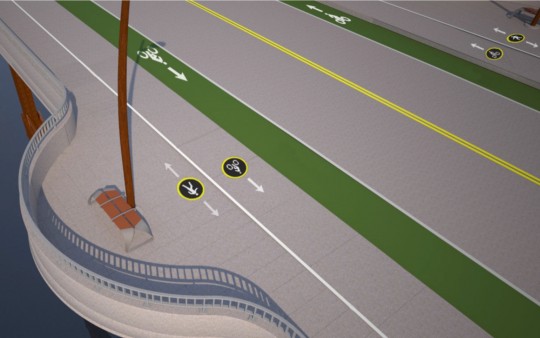
There will be a lot of waiting and seeing once the bridge fully opens in November. Two of the bicycling-related elements we expected to see will not be implemented: the green-colored bicycle-only lanes and the pavement markings (similar to ones on the Hawthorne Bridge) that are intented to separate bicycling and walking on the path. As we reported in July 2012, the final adopted design came with green concrete that would intended to make it clear to auto users that the curbside bike lane was not for parking or passing. “The concrete will be stained this dark green color,” a county spokesperson said at the time, “Our main goal is to indicate to drivers that the shoulder is a bike lane and that bicyclists have a right to be there.”
But according to a member of the the County’s Bicycle and Pedestrian Citizen’s Advisory Committee, the bridge will open without the green bike lanes or pavement markings on the path. Committee member Andrew Holtz shared in an interview this morning that when County staff asked them about the green coloring at a recent meeting, “We thought, let’s just see how it goes. Some sort of paint or coloring could be added later if there appears to be a big problem.” Holtz and other committee members don’t think encroachments into the bike lane will be a big issue because the bike lanes aren’t wide enough to use for passing. “There wasn’t a clear sense from the committee that it [the green paint] was necessarily any safer.” Holtz added that if people do drive and/or park in the bike lanes and if congestion on the path becomes an issue they’ll add the markings later.
It’s worth noting that back in July 2012, right before a final vote on the bridge design, the County proposed cost-cutting measures. One of those was to eliminate the $81,000 for “bike/ped surface treatments” that included the green coloring and markings. Thankfully that proposal died after it was fiercely opposed by then Mayor Sam Adams and the Bicycle Transportation Alliance. We plan on digging more into this and will have an update on the final design later this week.
The County expects the bridge to open to daily traffic either tomorrow (March 1) or Wednesday. Please note, while the main deck will be open, the bridge won’t be fully open until November. All cycling and walking traffic will share the northside path, which will narrow to six feet as it approaches the east end of the bridge until it’s fully built in October. The new section of the Westside Greenway Trail from the bridge to Willamette Park is expected to open in April.
UPDATE, 2:27pm: County spokesman Mike Pullen says that while green color will not be used on the bike lanes, there will be a two-foot buffer zone between the bike lanes and the center lanes on the bridge. “Our bike-ped committee believed that with this buffer zone added and the traffic lanes narrowed slightly to slow motor vehicle traffic, the green lane was not needed.” Pullen added that, “We are still exploring methods to add the green color to the full length of the bike lanes on the bridge.” As for the pavement markings on the path, Pullen says those will be added to the path once final striping is completed.
— Jonathan Maus, (503) 706-8804 – jonathan@bikeportland.org
BikePortland can’t survive without paid subscribers. Please sign up today.



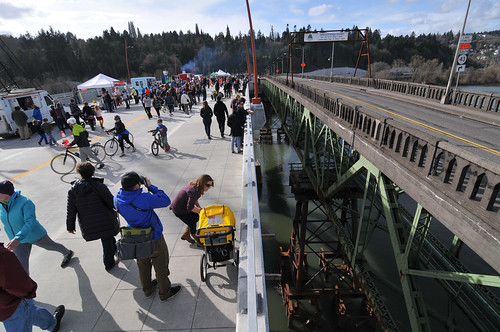
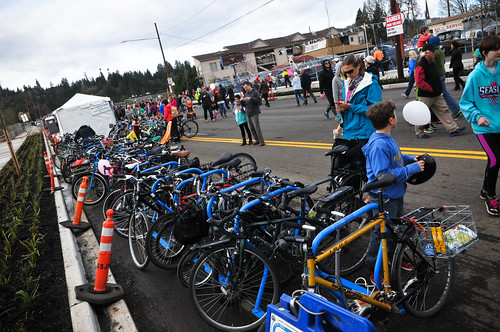
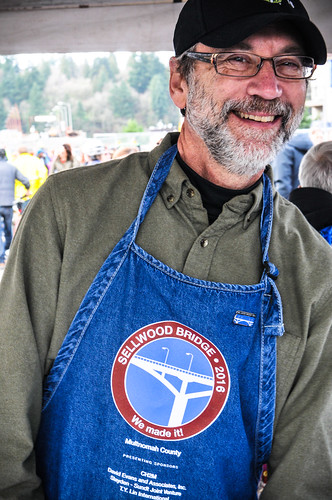
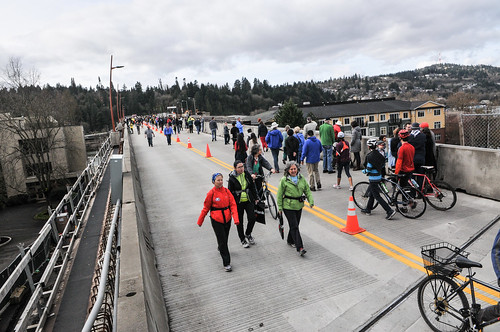
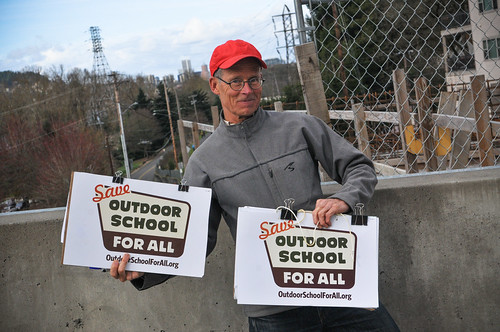
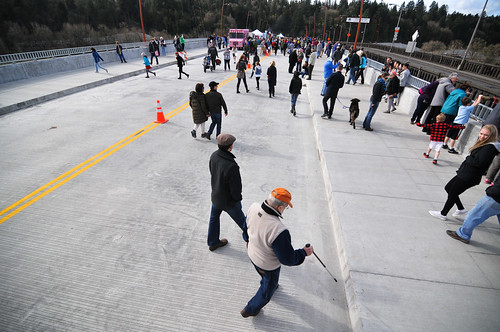
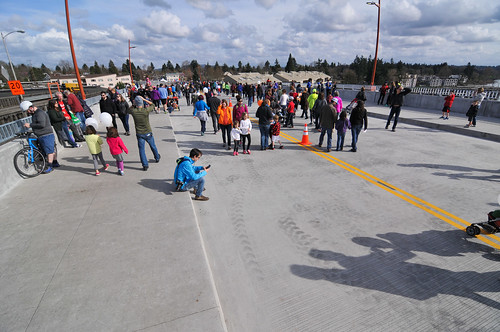
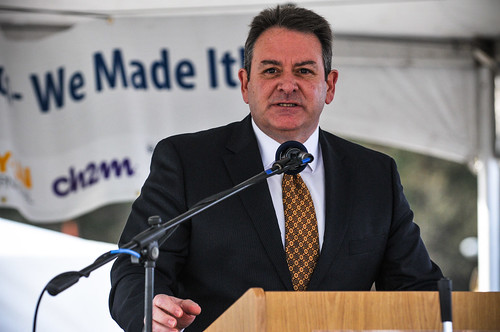
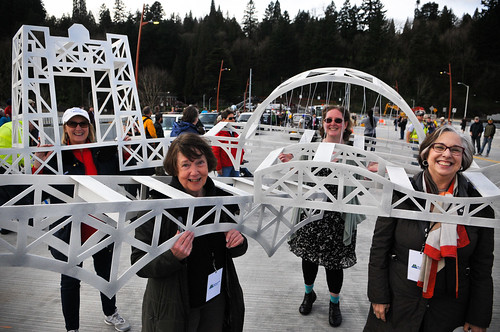
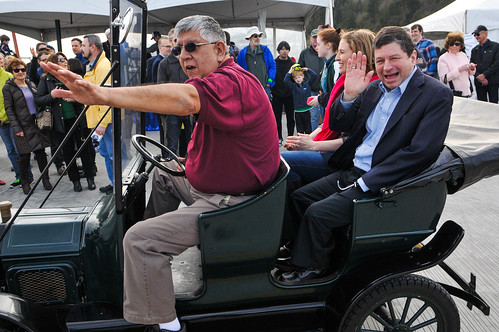
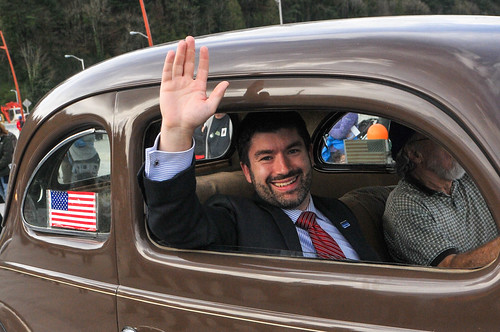
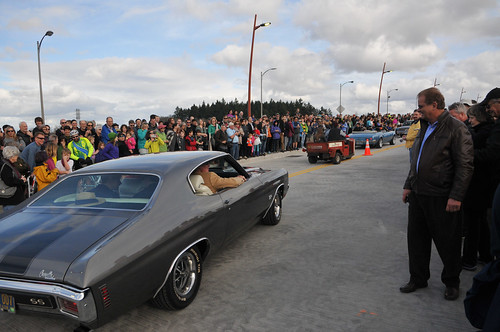
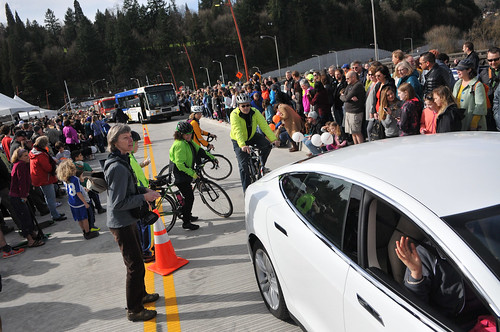
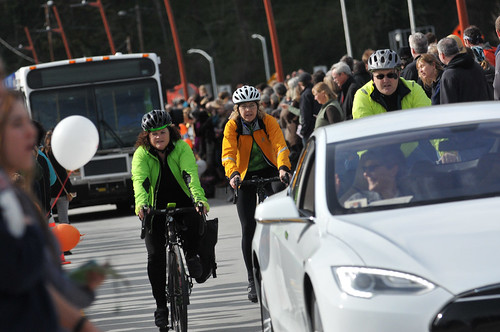
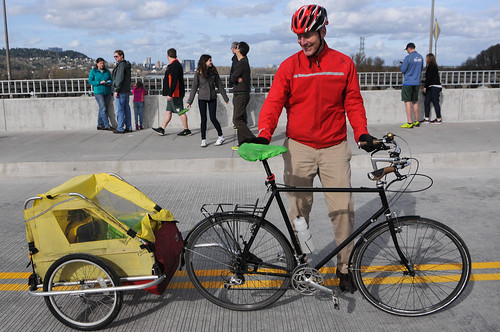
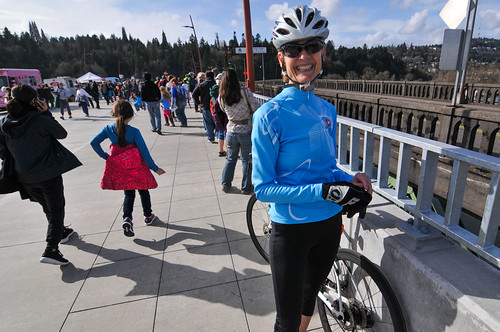
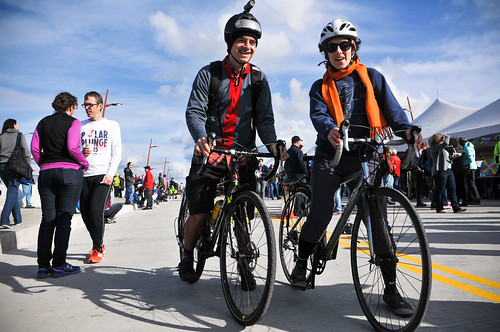
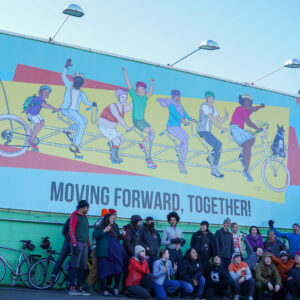
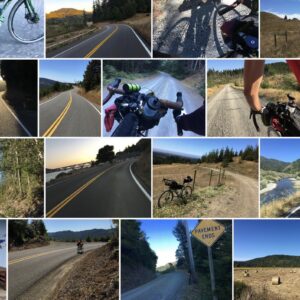
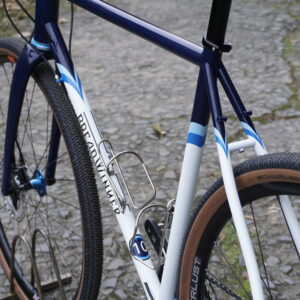
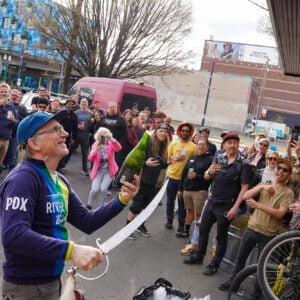
Thanks for reading.
BikePortland has served this community with independent community journalism since 2005. We rely on subscriptions from readers like you to survive. Your financial support is vital in keeping this valuable resource alive and well.
Please subscribe today to strengthen and expand our work.
The trolley guys were handing out trolley pamphlets.
As if people want a trail or a rarely-running trolley?
Especially with the fact that LO has yet to come up with any actual /transit/ utilization of that corridor – whether streetcar or bike. As a current LO resident (and despite the fact that my kids love riding the historical trolley) I can’t believe that there are zero long-range plans that have been set up for how to something else to get to LO besides “drive on the 43”.
Jeff Gufman (sp) on LO city council is investigating on how to install a parallel path on the trolley line.
You know why it feels like a “place”? Because the cars aren’t on it yet. Report back when it’s really open.
Passenger seat Jules… we read you loud and clear.
Where do the tool booths for Clackamus county residents go?
There are sidewalks on my street. Each resident is responsible for maintaining their own sidewalks in Portland.
Even though I walk on the sidewalk in front of my neighbors house on the way to and from the bus stop each day, I am not responsible for paying for the upkeep on that side walk.
Why is a bridge owned and ill maintained by Multnomah county the responsibility of Clackamas county?
If your neighbor agreed to help pay for your new shared sidewalk and you wrote the contractor a big check and then your neighbor said “nah on second thought I’d rather not LOL SUCKER” you might want to toll him then too.
But the person who made the promise was my Nanny, a hired helper, who in the end really didn’t have the right to commit to my paying the freight. When the family took a vote they said no.
There are a few other important details too. Your neighbor maintains that sidewalk because it’s your only route to the bus stop without a 10 mile detour. All 6 members of your family use that sidewalk to get to the bus stop and yet only 1 of your neighbors uses it. Yes, your family took a vote and decided not to help pay for the sidewalk, but that’s crazy rude, and your neighbor should charge you a toll now.
Because a large fraction of the users of the bridge are from Clackamas county. When did user fees become controversial?
Then build it, put scanners on the bridge to read license plates and charge those from outside Multnomah county for the privilege of using the bridge. The technology exists.
But don’t be surprised when all the other counties start doing the same for those who live in Multnomah?
Good. Let’s do that.
Suburban people who use urban infrastructure should not be able to pick and choose which ones they won’t pay for while still using them.
I want to see that house of hypocrisy burn down.
PAY to benefit from the services of a city or CHOOSE to live a rural agrarian 3rd world lifestyle.
I’m sick of paying your way
Rural agrarians might be willing to stop bringing the food you eat to town. Quite a selfish outlook. You people are driving me to vote for Trump just to spite you. Ha! This isn’t the Portland I loved not so long ago.
Unfortunately the data doesn’t support the “rural supports the city” argument. It’s also a strawman- the users of this bridge aren’t your happy farmer, they are suburb-dwellers commuting into/across town.. and suburbs are definitely not pulling their weight in society.
That’s not lost on me. It still a crappy remark lacking any real critical thought. I
Well, so wait a minute; the bridge is “open” but only “fully open” to cars right now? Pedestrians and bicyclists will share the North side path, which will narrow considerably? Fine if there’s no green paint, and no trail connections yet, but I don’t even see any white paint, i.e., a bike lane stripe and stencils. Yet there is bright, new yellow paint to tell the car drivers where to be. It still seems super-obvious who the really important bridge users truly are…
Give it a break. Beginning tomorrow the accommodations for bicyclists and pedestrians will be MUCH better than they have at any time in the last 90 years. The “incomplete” bicycle/pedestrian facilities available tomorrow will be twice as wide as the facility was last week! Furthermore, the system for motorists will NOT be “fully open” as you claim it will be. There will still be a long detour (to Taylors Ferry) for any vehicles wanting to cross the Sellwood Bridge westbound and go south toward Lake Oswego on Highway 43.
Detours aside, I’m just talking about the bridge itself. Sure things will be “better” for bicyclists compared to what was there before for bicyclists, but I think about it this way:
Drivers got meatloaf for 90 years while cyclists ate dirt. Now, at the new restaurant, everyone ordered—and was promised—sirloin burgers with with hand-cut, artisenal fries and a cold local microbrew. Drivers will soon be served everything but the beer (bummer!), while cyclists and pedestrians will be sharing a large order of McDonald’s fries until further notice. But yeah, I guess beggars can’t be choosers.
“Better than before” gets in the way of “world-class”.
Your own exclusive definition of world-class gets in the way of world-class.
Not my definition. I use the definition of countries like The Netherlands, Denmark, or even Poland, who all build far better bike and public transport infrastructure than we do.
Netherlands, and Denmark… Two of the richest countries in the world, that may equate the size of the West side of the Oregon coast range,….maybe. Poland certainly is not a rich country. When I was there in the 1990s I saw very little “world class” infrastructure. That could be way different now.
I appreciate your misdirected passion. It makes me laugh. We are a city, in quite a different country all together. I dream too, but I live with reality.
And it goes farther than that here in that, excluding detours at either end of the bridge, it is clear who we decided to serve first. Even though it might not be “world class”, we could have only asked pedestrians to share the north path and at least painted the bike lane stripes on the main deck to give bicyclists and pedestrians their own space, even while finish-up construction is underway. Until bike lane stripes are painted on the deck, is that north sidewalk considered a sidepath that bicyclists must use? Or would a bicyclist be legally free to use the main bridge deck now?
Wouldn’t a side path require a signed traffic engineer’s report certifying it as safe in order to be mandatory use? If it’s not complete, I doubt if anyone has signed such a report.
“All cycling and walking traffic will share the northside path” — imperatively is a strange way to phrase that.
You’re incorrect about the “bicycle-only” lanes being bicycle-only. Multnomah County has them listed as “two 6.5-foot bike lanes/emergency shoulders”. Make no mistake: the only reason those bike lanes exist at all is to maintain Level of Service for drivers in case a crash blocks a lane. With the massive highway interchange at the west approach mandated by ODOT, both travel lanes being twelve feet wide, and nothing to narrow the field of view for drivers, expect rampant speeding on this bridge. This will make the 6.5 bike lanes unsafe and my guess is most people will use the shared sidewalk anyway.
In the space the bike lanes and bike half of the shared sidewalk take up, we could have built a cycle track separated from both the roadway and sidewalk.
That is pretty much the case for all bike lanes. It is legal to block them and for loading and unloading cargo, passengers, and to use them to route auto traffic in emergencies as you have described.
Bikes lanes always have been and will always be road shoulders – just better maintained (we hope).
It’s a rare instance when I would advocate for grade-separated facilities. However, on a bridge, which has no intersections, this seems like a no-brainer. The bike lane/side path on each side should have been combined at a grade above the travel lane and below the sidewalk for a wide bike path.
This thing looks like it was designed by a committee whose charge was to check off as many boxes as possible rather than thinking things through and making the best bridge possible. Even Jonathan will hang up his pom-poms and laugh/cry at this one in a few years.
I want to be happy about the SO MUCH BETTER BRIDGE THAN BEFORE, but I just find it annoying that a public official feels that it’s OK to delete planned paint and markings until it can be shown that there are “big problems” with safety.
I also find it amazing that anyone on a bike willingly wants to ride on the same surface as cars, right next to them. Perhaps it’s because the separation markings on the raised deck were deleted, or perhaps the vehicular cycling psychosis is still at epidemic levels in the US.
Right? They’d never make that argument for car infra! “Oh, we we’re going to paint lane lines on this highway, but decided to wait and see how drivers react to a three lane highway without lane lines”.
I would probably ride in the lane and direct my kids to ride on the path. With a protected/raised lane and priority treatment, different story. Without any bike markings, e-bikes cannot operate on the sidewalk.
Please stop thinking this is VC vs not — what you have here is a choice between two evils due to bad design. Whether you want to share a surface with puppies and toddlers vs vehicles is more likely a calculus about speed, connectivity, and what happens when you swerve or crash into the roadway to avoid killing a toddler.
There are no barriers because the “traffic engineers” want a breakdown lane for their cars. We sure did engineer us up some traffic, yep.
The slogan “Better than what we had.” would also have been true if we just closed the old bridge to cars and threw the money in a fire.
i agree that it is amazing but not everyone who does this agrees with VC ideology. for example, i learned to love the bomb via near daily exposure to adrenaline in the 80s and 90s but still believe VC is an ideological recipe for 1-2% mode share for ever.
No, it is because in general it is safer to ride next to cars than children, dogs, peds wearing headphones, etc.
I was very disappointed on Saturday to see the lack of green concrete. What was reported is that it wouldn’t just be paint, but would actually be a permanent part of the structure. From the 2012 article:
“The City’s Bureau of Transportation has had difficulty maintaining thermoplastic and some people feel it’s too slippery when wet. Pullen says the County’s green pavement won’t just last longer, it will also be much darker than the bright green used by PBOT.
‘The concrete will be stained this dark green color, so it will be integral to the concrete. The color should not wear out the way a painted bike lane does’ “
Agreed, this is a huge bummer. Adding the color as thermoplastic after the fact means more money and more maintenance in the long run. Sigh.
County wouldn’t use thermoplastic. I’m still researching this story… But apparently county engineers have a way they can add color to the concrete when/if they decide to.
That’s interesting. I assumed the method for add color to the concrete was adding a pigment to the wet mix.
If it’s possible to stain exterior concrete that has already cured I’m curious about why TriMet didn’t do that when they retrofitted SW Moody.
I assumed that too but apparently that’s not the case.
As for why TriMet didn’t do it. Well, every agency has its own engineers and work crews and they always compare notes.
Interesting! If this is indeed the case, here’s looking forward to this sort of implementation in future projects.
“let’s just see how it goes.” THIS MAKES ME SO MAD! what kind planning is THAT? did anyone who bikes have input into that decision?
(anyone who BIKES have input, I mean.)
Engineers are required to follow the MUTCD except apparently when they don’t feel like it for bikes.
Yes, they did. According to this article, this was OK’d by the MultCo Bicycle and Pedestrian Citizen’s Advisory Committee.
Then I still question whether anyone on that committee actually rides a bike.
Yup, backsliding already. And do they get to pocket the “extra” money that was allocated for the green concrete and whatever else?
It boggles the mind that someone who sits on the County Bicycle and Pedestrian Citizen Advisory Committee say this.
Encroachment is the most significant problem with painted bike lanes.
Just where do you see frequent encroachment? I’ll tell you where I see it: 1) where motorists are making left turns and motorists illegally drive in the bike lane to pass them and 2) where there are high volumes of passenger drop-offs, I don’t think either condition will be present on the Sellwood Bridge.
I experience very frequent encroachment on the straight part of Terwilliger at the bottom of the hill. I’ve been grazed by mirrors several times on Terwilliger. I have also experienced encroachment on NE Broadway/Weidler, SE Madison, SE 7th, SE Belmont etc.
Natco guidelines list the benefits of colored bikelanes:
http://nacto.org/publication/urban-bikeway-design-guide/bikeway-signing-marking/colored-bike-facilities/
As does PBOT’s best practices:
https://www.portlandoregon.gov/transportation/article/334689
And according to PBOT guidelines the Sellwood Bridge is exactly the type of location where a colored bike lane would be recommended:
“Heavy auto traffic streets with bike lanes” should never have had bike lanes in the first place. This is the exact kind of road that calls for physical protection.
I agree. This bike lane is essentially a breakdown lane and emergency vehicle lane masquerading as a bike facility.
It honestly would have been better for the County to just paint the bike lanes as shoulders with hash-mark striping instead of telling people it’s okay to ride in these dangerous bike lanes.
The bike lanes on the bridge are not dangerous……
The most common “encroachment” I encounter are the folks on Willamette Blvd. that simply can’t seem to keep their cars out of the bike lane. They aren’t turning or stopping to unload or anything. In many cases, they’re just barreling dead ahead, driving with their right tire on top of the bike lane stripe. It’s like they are afraid to get too close to the center lane stripe.
Sigh… It makes me wish that cars were equipped with a cattle prod in the seat that zapped drivers any time their vehicle drifted over into another lane.
And when they say they’ll install it AFTER there’s a problem, how long will it take to determine a problem and how long will it take after that to fix it? We’re looking at a year or two, at least. ARGH
It depends… if(when) someone gets killed by an inattentive driver they will probably fix it pretty quick in hopes that that will make the angry activists go away.
No, they’ll just publicly chastise the victim by criticising his/her decision to ride in the bike lane instead of up on the sidewalk.
Or they’ll blame anything other than road facilities that are substandard by the parameters which all parties agreed to.
() oh the bike rider was _____ (doesn’t matter, you can make up any crackhead theory to transfer blame to our “inferior” species)
() the car driver was at fault, road design had nothing to do with it
() ummmm…. the sun was in my eyes.
Adam H.:
“In the space the bike lanes and bike half of the shared sidewalk take up, we could have built a cycle track separated from both the roadway and sidewalk.”
Although I dislike the term ‘cycle track’ (much prefer ‘protected bike lane’), I agree this was a missed opportunity. Unwanted pedestrian & bike interactions are much more likely with this design.
Even if wanting to separate fast riders from slow riders was the reason for the split bike facilities, a protected bike lane that is wide enough for people to pass (13 feet in each direction when you add up the bike lane plus half the sidewalk) would have worked just as well and offered even fast riders protection from car drivers.
And given the fact that this is a new facility the added expense would have been minimal (slightly lower concrete for the bike lane and slightly higher for the ped section).
Absolutely. The standards should be much higher for brand new infrastructure vs something that is retro-fitted.
The Portland Department of Transformation is going to need a lot more cones…
Ah yes, scaling back already sketchy cycling infrastructure. “it’s an experiment”.
Personally, I was most surprised when Novick listed all the departments that contributed money to the project, called out Clackamas County for contributing ZERO, and then recommended invading Clackamas County to get them to cough up for the 70% of trips they make over the bridge.
Autocorrect changed NOVICK to Novice. How embarrassing!
This is why he will be getting my vote. He definitely understands transportation issues and is willing to point out problems and propose solutions. Unfortunately, everyone seems to want to run against him because of the Street Fee debacle, while ignoring the real barrier to progress in this city, whom is also up for re-election.
Say What????
I’m in Novick’s corner on this one and I’m not his biggest fan.
What’s the definition of “big problem”. That means someone has to die first? Or what is the metric they will use to define it in this case?
Please note the following update just added to the story:
UPDATE, 2:27pm: County spokesman Mike Pullen says that while green color will not be used on the bike lanes, there will be a two-foot buffer zone between the bike lanes and the center lanes on the bridge. “Our bike-ped committee believed that with this buffer zone added and the traffic lanes narrowed slightly to slow motor vehicle traffic, the green lane was not needed.” Pullen added that, “We are still exploring methods to add the green color to the full length of the bike lanes on the bridge.” As for the pavement markings on the path, Pullen says those will be added to the path once final striping is completed.
Good to hear the pavement markings are going in on the sidewalk. As far as the roadway, buffered bike lanes are still substandard safety-wise for a bridge that will likely see 35-40 MPH traffic.
How much will the two-foot buffer narrow the 6.5 foot bike lanes? I can’t imagine the 12 feet travel lanes will be narrowed to 10 feet.
It needs cones. Or “turtles” like near the soccer stadium. Can still use it as “breakdown”, but it becomes much more delineated.
My hunch is that the County will be open to making changes to the design if needed for safety. I’m sure the issue will be discussed at the bike/ped committee.
My personal recommendation would be to ditch the bike lanes entirely and just admit that they’re really emergency pull-off lanes by striping hash/chevron markings. Encourage everyone to use the much safer shared sidewalk by striping a line down the middle similar to the facilities on Tilikum Crossing. The VC crowd will just take the travel lane in the roadway anyway.
I’m going to reserve judgment until the bridge is completed and we can see how it feels to ride on.
Me too, although current design seems too close to the bike lane design of the Burnside Bridge. Hopefully the two-lane design cuts down on speeding, though.
I was pleasantly surprised at how tall the curb was! Looks like at least 10 inches, and should provide comfort for people riding.
my normal cruising speed is too fast for a shared environment so i am going to ride in that bike lane. just because i have a different risk tolerance does not make me VC!
Fair enough. The people comfortable with taking the lane will anyway, but we should be encouraging everyone else to use the shared sidewalk.
Was hoping to see more emphasis on peds/bikes but it’s still a huge improvement from the old narrow sidewalks of past.
If you came here to see bikeportland supporters complain about world class infrastructure being celebrated, you won’t be disappointed.
“world class infrastructure”. really?
it isn’t even good by American standards.
Painted bike lanes are not “world class”.
It has a bike path separated from traffic by a concrete curb. But I know, I know, that’s not good enough for you because you have to share half of the 24 foot path with other people that happen to be on foot. We’ve had this same conversation a dozen times before.
Yes we have. And the point still stands. Neither shared sidewalks nor painted bike lanes are world class. Shared sidewalks can be acceptable for retrofitting a 100-year old bridge. However, this being a brand new bridge, there should have been a protected cycleway that was grade separated from both motor traffic and foot traffic. There’s no reason that this can’t be done. All that’s required is to lower the curb a bit for the area people are expected to ride on the sidewalk. Wider would be even better.
Instead of forcing people cycling to choose between riding next to motor traffic in a unprotected lane and sharing space with people walking, we could have built a single cycleway that’s fully separated from all other modes. Full mode separation is what we mean by “world class”.
Thank you.
If you came here to see bikeportland critics argue that a shared pedestrian path and common bike lane are world class bike facilities, you won’t be disappointed.
ummm… Spend a little time in Denmark, France, Germany, Sweden, Netherlands, Finland, Normay… then get back to us about that comment.
Stockholm Syndrome — is not named for their bike facilities.
It’s fitting that the new bridge has (or will have) vastly improved bike facilities (a Multnomah County priority) but no additional motor vehicle lanes (which I assume would be the Clackamas County priority).
There’s only 1 lane each direction because Tacoma is only 2 lanes + a neutral lane, and won’t likely ever be upgraded. They could have made it four lanes wide but it’s still emptying onto a local commercial street.
Regarding the comments about free-loading Clackamas County: maybe it’s time for cities/counties to stop making all their roads connect to neighboring jurisdictions for all modes. What’s wrong with somemost of the roads from Clackamas into PDX being “diverted” so that only pedestrians, cyclists and buses (need some sort of motorized bollards) can go straight through?
actually, it can’t open on the other side yet because they haven’t finished building the bridge. There is ample room on one side of the bridge and there will be twice that amount when the bridge is complete. It has nothing to do with priorities–they have clearly prioritized bikes! they could have closed the bridge to all traffic, but instead said that they wanted to keep the bridge open for bikes and cars….
Sad that no local service TriMet bus will be provided here to cross the all-new bridge.
I just rode home across the new bridge. It had only been open 20minutes! Friendly people directing traffic said I might have been the first bike.
My kids are totally psyched to ride across it on the way to school. No we don’t need to cross the river, they just want to try it out.
I reckon it will be much better to walk or ride across it than to drive. In the middle there will be more space for people than cars.
This will be the best bridge in Portland for human powered transportation. Whether that’s a cause for celebration or complaint is an exercise for the reader.
How was the connection to Macadam?
The sidewalk transition is better (not a sharp corner any more) but the trail isn’t open yet. Still ride on the Macadam sidewalk to Miles Pl.
Definitely a minority here, but I am interesting in this experiment.
If the drivers are able to keep to their lanes without bothering riders, then it’s good for everyone as it would show that drivers are getting better at sharing spaces.
Cheers to a transportation future of integration, comradery, and lots of bicycles.
Well, seems we’re still off by a few years. *takes a drink*
http://bikeportland.org/2016/03/01/new-sellwood-bridge-opens-with-a-dang-176542
Good on Novick for calling out the freeloaders. I’m not usually a fan of his but I think it is important for the public to know how this all works and who contributed what.
The problem with his criticism is that Clackamas County is a big place. There are places in Clackamas County that are closer to Salem or Hood River than to the Sellwood Bridge. What would have been fair is to have residents of Oregon City, Gladstone, and Milwaukie help pay for the bridge. Someone living in Government Camp or Marqum will rarely have need for the bridge but someone living Gladstone would likely use it regularly.
There are places in Mult Co just as far away. The bridge allows large numbers to commute from Clackamas county, where they pay taxes to the county. Since the Clackamas folks who won’t use the bridge still benefit from those taxes, I don’t see the issue with asking the whole county to chip in.
Obviously, we need a common definition of a world class bicycle facility. I propose the following for use by the bikeportland readership:
A facility shall be considered a world class bicycle facility when:
The facility provides for exclusive use by bicyclists with separation of bicyclists by speed, skill level, and commonality of purpose for use.
The facility shall be designed and operated such that there will be no intrusion by non-bicycle traffic, including but not restricted to pedestrians, skateboarders, Segways, etc.
The facility protects the users from dangerous events such as meteor strikes, earthquakes, tsunamis, etc. and from undesirable elements such as headwinds, rain, and sun glare.
Finally, the jurisdiction responsible for the world class facility shall annually certify that “No motor vehicle was used during the conception, design, construction, or maintenance of the facility and no motor vehicle, including emergency response vehicles, traversed the facility during the past year.”
We can conclude based on this definition that the Sellwood Bridge is a “big failure.” Thanks.
Also protect against gamma-ray bursts and inadvertent thermonuclear explosions.
White on white (concrete deck) striping isn’t that effective.
The solid green bike lanes are crucial and may even help with traffic calming when no cyclist is present.
Usually, a black outline can be painted around the white striping to improve visibility. This was done on Tilikum Crossing.
Yes that will work if you want two slivers of black paint that may or may not be seen at 40mph.
I would like to see large areas of contrasting colors so drivers and cyclists know what area they should be in. (I have similar opinions on the bus mall)
It took less than 24 hours for a driver to drive on the pedestrian section, get stuck, and abandon their truck. Meaning that the bridge had to be closed to move a concrete barrier. http://katu.com/news/local/pickup-stuck-on-sellwood-sidewalk-crews-lift-it-with-forklift
Probably someone that lives in Clackamas County…
…thought it was the toll lane.
‘Murica.
When did the Onion change it’s name?
Portland: we’re so weird that the Onion can report honest news.
Merc: “a very confused person who thought the sidewalk was the road, and got his truck stuck in between a concrete barrier and a guard rail. And then? ABANDONED THE TRUCK.”
If you are found intoxicated in the driver’s seat there are very specific and heavy consequences for DUII.
But, as we know from a few cases reported on at this very website, if you leave the vehicle the burden is on the police to prove that you were operating the vehicle under the influence at that exact time.
So, from the driver’s perspective, there really is no reason to stay.
clearly a failure of the infrastructure and not the user. Oh, wait…this was an auto. So yeah, it HAD to be the driver.
““We’re going to need to find a way to invade Clackamas County to recoup some of our costs”
Portland gets its water from Clackamas County.
I can envision some interesting responses to an invasion by Portland.
We can also surcharge Multnomah County for having Multnomah County residents overuse the state prison system.
The equivalent would be if Clackamas County built a water system from which 80% of the water was used by Multnomah county and Multnomah county agreed to pay for part of the construction costs, but then after the project started they changed their mind and contributed no money to the project but once it was complete went ahead and took the water for free anyway. Is that what happened Random?
I find it odd that Milwaukie and Gladstone would be drinking the foul stuff that comes out of the taps down there if they owned the Bull Run water.
It doesn’t really matter what county the Bull Run Watershed is in because the Feds own that land. At any rate, the Bull Run river weaves back and forth over the county border anyway.
Overuse the prison system how? Is the prison population disproportionately Mult Co on a per capita basis? Or is it disproportionate on a tax contribution basis? Thanks in advance for the data.
Generally speaking, cities generate more tax revenue than they consume. Rural areas (and rural states), by far, are a net consumer.
Roadway needs a shoulder for emergency vehicles. If the bike lane were walled off, it wouldn’t be a shoulder, and the bridge would have to be significantly wider. Wider means more costly. As well as the problems with sweeping a walled-off bike lane.
As it is, the bike lanes are better than those on the Burnside Bridge (since there is a buffer) which work perfectly fine.
If you are uncomfortable riding in the bike lanes, then ride on the raised path, it is wide and will have bike markings.
This bridge has the best bike accommodations of any Portland bridge, given that it has both a road grade bike lane and a raised bike/ped path.
I don’t understand, however, why the the bike lane wasn’t dyed green when the concrete was poured.
To provide some history to those who are unsatisfied with the bridge cross section and final designs: During the design phase in 2010 – 2011, there was a Mult. County sponsored Bike – Ped Technical Working Group (separate from the Bridge’s Community Advisory Committee and separate from the County’s Bike Ped Committee). The Technical Working group was composed of multiple agencies and bureaus staff members, consultants, advocacy groups and community members.
Over nearly 2 years of meetings, designs were worked out for much more than the cross section: The west side interchange was extremely complicated; and the Willamette Greenway Trail on the west side from the new bridge north toward Willamette Park was way more complicated than you might expect. Throughout all this time and process, there were many difficult discussions about alternative designs that would be even less accommodating and less safe to cyclists and pedestrians than the final design that some of you criticize today.
When the final designs were approved by the MC Commissioners in July 2012, I testified against a last minute recommendation by the project team to save $$ and switch to an asymmetrical cross section. The Commissioners agreed…
Please remember the concept of a world class facility was not well defined 5 – 6 years ago; and consensus on a major project is not as easy to reach as you might think. I encourage people to devote dozens of volunteer hours to a large project like this. The time spent working with others will increase your credibility It will also help build the relationships needed to complete a major project that serves all modes, rather than just showing up to complain once a project is complete.
Big effin’ “WHOOHOO” shout out for Roger! This seems logical. I notice no one has offered an intelligent rebuttal. Anyone have anything to offer here on his point of view ?
What’s happening to the old bridge?
How about a dragstrip. We need a dragstrip.
Anyone think of just leaving the old bridge up for bikes and peds, then make the new bridge a real improvement for traffic flow with at least 2 lanes each direction????
Keeping the old bridge for bicyclists and pedestrians was actually one of the options considered. The seismic vulnerability of the old structure was one of the reasons that option was dismissed. Details can be found in the library section of the project website.
We need to tear down every bridge that won’t withstand a 8.0 earthquake.
If there is an honest suspicion that the decision not to pour green concrete was a cost cutting measure to line the pockets of the companies involved then we really have bigger concerns.
What WOULDN’T they have scrimpt on and ignored established engineering practices so they could tell the vaunted “Portland comes in under budget again” story again?
Did they actually meet structural requirements that were layed out at the beginning of the project? Seismic survivability targets? Bridge deck thickness? Metal alloy corrosion resistance? Foundation depths?
There are so many places they could have cut corners so that they wouldn’t be the first major Portland Metro construction project over budget that it seems likely to have happened or will happen soon.
Could the unpainted bike lane be the not-green tip of a shoddy construction iceberg?
I expect I’m wrong but little stinks-of-corruption incidents like this make not trust them.
Car bridge to the left. Totally free of car bridge to the right. Don’t look. We are tearing it down.
Multco originally had a proposal from Bechtel to replace the bridge for $90 million.
So what Multco/ODOT built actually is $250 million over budget.
Anyone wonder why?
In my opinion, our practice of contracting projects to the lowest bidder is a serious problem.
Can’t wait to ride it. My next visit to Portland is coming up in April.